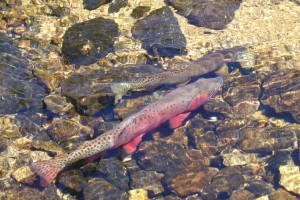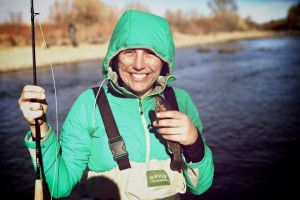With over 50 TU Costa 5 Rivers Clubs in the country, there are only six club presidents that have the honor of being called a Costa Ambassador. David Muench, President of the CU Fly Fishing Club, is one of those six to have received the honor. The Costa Ambassador program was created as an incentive to inspire the college club presidents to do a great job with their clubs. At the end of each semester Muench sent in a summary of all of the club's activities and programs. As president and Costa Ambassador, he had to help his club organize, everything from organizing fishing and cleanup trips to recruiting and teaching new people to fish.
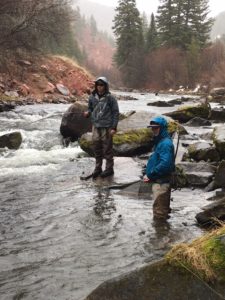 "It means a lot to me to be nominated as one top ambassadors in the Nation," said Muench. "I've easily put in a similar amount of time into the club as I have my final year of Engineering, I care a lot about the fly fishing club and it's amazing to realize that you're one of the best in the nation. No matter how much work I put in, I keep finding myself wondering if we could have done it better and what we've done wrong. It's just something else to have someone else say you're one of the best in the Country."
"It means a lot to me to be nominated as one top ambassadors in the Nation," said Muench. "I've easily put in a similar amount of time into the club as I have my final year of Engineering, I care a lot about the fly fishing club and it's amazing to realize that you're one of the best in the nation. No matter how much work I put in, I keep finding myself wondering if we could have done it better and what we've done wrong. It's just something else to have someone else say you're one of the best in the Country."
As president of the CU club, Muench has helped expand the members, activities and programs they partake in. The group helped participate in the Boulder Flycasters Chapter Youth Night by helping teach kids casting. The club also held two intro to fly fishing classes, and a BBQ club dinner included with every trip.
Muench joined the club in 2014 and became an officer right away. The president before him, Justin West, showed him how a good club president operates and inspired him to take the club to the next level. The club now has over 50 participants and about half them partake in the weekend trips.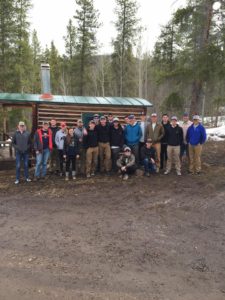
The former president also built the foundation in which Muench could grow the club on, "In the year before Justin, the club really consisted of just one fall trip and was completely inactive in the spring semester. Justin and all of the officers last year really put a lot of effort in getting the club's name out there and trying to get people more involved in the club. We started doing weekly tying nights, and tried to run some more trips. We did a lot of networking and really tried to grow our numbers. It was a tough year with poor turnouts, our last trip we had 5 people show up, however it laid the groundwork for this year."
When Muench took over, the club began new focus on recruiting new people who wanted to be apart of it by adding new events and making the meetings less intimidating. "This year we decided to stop trying to convince people to join and focus on making the club fun for those who wanted to be a part of it. I also wanted to put a lot of focus on making the club un-intimidating and welcoming to beginners and intermediate anglers. We ran two intro to fly fishing classes in the fall that were a huge success. The club has grown to over 50 active members this year, we ran four weekend trips with our worst turn out being 18 people and our best being 28. We also put a lot of emphasis into building relationships among the club members, we implemented a big club dinner/BBQ into every trip to try to get people to make friends among the club."
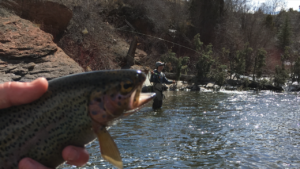 The success of the club doesn't stop there. David is hoping that the new president, Ryan Watson, will take the club even further and continue to expand, as well as have an improved focus on conservation.
The success of the club doesn't stop there. David is hoping that the new president, Ryan Watson, will take the club even further and continue to expand, as well as have an improved focus on conservation.
Included in expanding the program is working with other college programs. CU and Colorado State University may be rivals on the football field, but on the river, they're all on the same team of river stewardship, "CSU started a club this spring and were hoping to have them tag along on a couple of our trips, and help them out in any way we can. Having another club so nearby creates so many opportunities, from conservation to fun competitions."
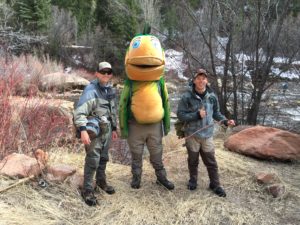 Being in the fraternity of a select few Costa Ambassadors, the role doesn't stop after graduation. Muench plans to continue to stay involved with TU and make a difference for Colorado's rivers and trout.
Being in the fraternity of a select few Costa Ambassadors, the role doesn't stop after graduation. Muench plans to continue to stay involved with TU and make a difference for Colorado's rivers and trout.
Muench graduated in the Spring of 2016 with a bachelor's degree in engineering from CU Boulder. He plans to move to Denver and stay involved with TU and work with the local chapters and groups in the area.






 "Two worlds collide, rival nations, it's a primitive clash, venting years of frustrations. Bravely we hope, against all hope. There is so much at stake, seems our freedom's up against the ropes. Does the crowd understand? Is it East versus West? Or man against man? Can any nation stand alone?"
"Two worlds collide, rival nations, it's a primitive clash, venting years of frustrations. Bravely we hope, against all hope. There is so much at stake, seems our freedom's up against the ropes. Does the crowd understand? Is it East versus West? Or man against man? Can any nation stand alone?"

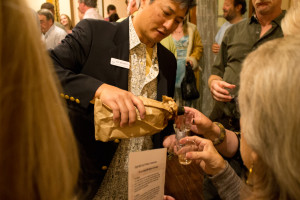 For trout and Trout Unlimited members, the warmer months are when the most activity occurs. It’s easy for trout to become more active as the food sources are more abundant. But for people to become active in a cause bigger than themselves, it sometimes takes some extra motivation. And there’s no better way to become motivated than to discover one’s true inner conservationist.
That’s where the Colorado Trout Unlimited Rendezvous comes in.
For trout and Trout Unlimited members, the warmer months are when the most activity occurs. It’s easy for trout to become more active as the food sources are more abundant. But for people to become active in a cause bigger than themselves, it sometimes takes some extra motivation. And there’s no better way to become motivated than to discover one’s true inner conservationist.
That’s where the Colorado Trout Unlimited Rendezvous comes in.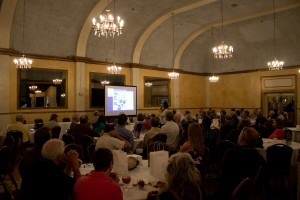 welcomed everyone and CTU and national TU employees introduced themselves to the participants. Following the welcome lunch, the group broke out to learn more about the roll women can play in TU, ways to engage members more effectively, best practices to implement conservation projects, and they learned how fishing guides throughout the state implement conservation into their trips and lessons.
welcomed everyone and CTU and national TU employees introduced themselves to the participants. Following the welcome lunch, the group broke out to learn more about the roll women can play in TU, ways to engage members more effectively, best practices to implement conservation projects, and they learned how fishing guides throughout the state implement conservation into their trips and lessons.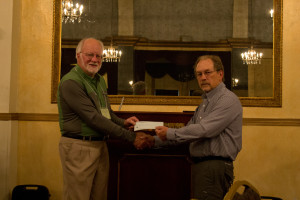 During the State of CTU address, the council also awarded Gomolchak grants to different chapters for work on temperature monitoring, greenback restoration, improving fish tanks, and much more! The board also voted on the new Director At-Large candidates.
During the State of CTU address, the council also awarded Gomolchak grants to different chapters for work on temperature monitoring, greenback restoration, improving fish tanks, and much more! The board also voted on the new Director At-Large candidates.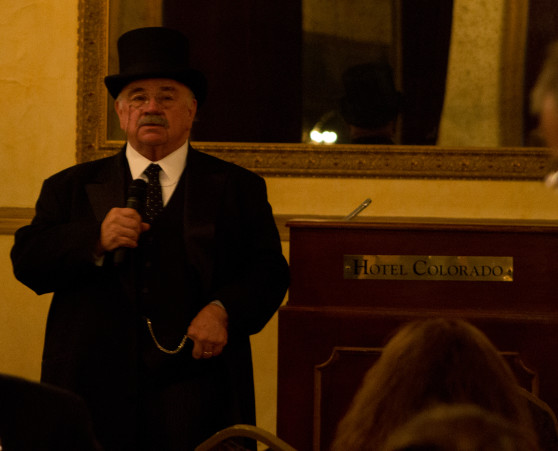 that way as the ghost of our 26th president, Theodore Roosevelt joined our dinner banquet and talked about his life’s journeys and how the open wilderness changed his perspective on life. He went through his days as a boy with asthma living in the city and how the open air of the woods would help cure him mentally and physically. Teddy spoke to the point of how we all should carry on his legacy and protect and fight for the wilderness so it can improve everyone’s quality of life.
that way as the ghost of our 26th president, Theodore Roosevelt joined our dinner banquet and talked about his life’s journeys and how the open wilderness changed his perspective on life. He went through his days as a boy with asthma living in the city and how the open air of the woods would help cure him mentally and physically. Teddy spoke to the point of how we all should carry on his legacy and protect and fight for the wilderness so it can improve everyone’s quality of life.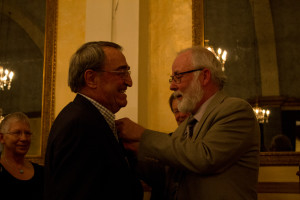 The final morning started off with a breakfast sessions where members could learn more about engaging the youth and next generation of anglers and conservationists. Following the panel, the groups broke out into sessions that spoke about how chapters and members can use social media to help spread their message and word as well as how the state and organizations are working to improve native trout fisheries.
The final morning started off with a breakfast sessions where members could learn more about engaging the youth and next generation of anglers and conservationists. Following the panel, the groups broke out into sessions that spoke about how chapters and members can use social media to help spread their message and word as well as how the state and organizations are working to improve native trout fisheries.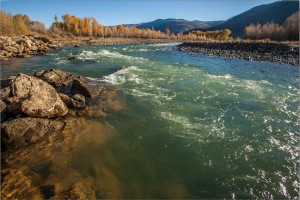
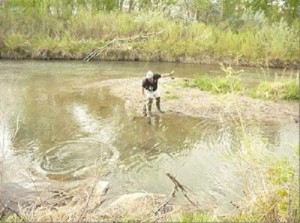
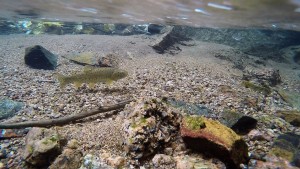
 Changes being proposed are potential, but the fish need our help. Trout Unlimited is conducting a
Changes being proposed are potential, but the fish need our help. Trout Unlimited is conducting a As the flows of the river are diverted and reduced, the water temperature could rise to a level threatening to trout and aquatic life- but with the 401 permit, these conditions will be monitored to ensure the fishery remains Gold. Also with lower flowers, the sediment and algae buildup cements between the cobblestone, preventing invertebrates to hatch and trout to spawn. By providing these flushing flows the sediment will be washed away and leave the cobblestone clear for aquatic habitat to survive.
As the flows of the river are diverted and reduced, the water temperature could rise to a level threatening to trout and aquatic life- but with the 401 permit, these conditions will be monitored to ensure the fishery remains Gold. Also with lower flowers, the sediment and algae buildup cements between the cobblestone, preventing invertebrates to hatch and trout to spawn. By providing these flushing flows the sediment will be washed away and leave the cobblestone clear for aquatic habitat to survive.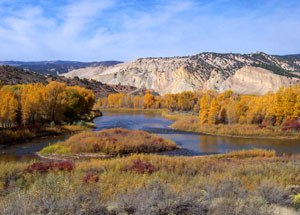 The decision comes after CPW has been monitoring unnatural stream flows, sparse aquatic habitat, and low nutrient content all contributed to the decline of the water. CPW said that stretch of the river hasn’t met the
The decision comes after CPW has been monitoring unnatural stream flows, sparse aquatic habitat, and low nutrient content all contributed to the decline of the water. CPW said that stretch of the river hasn’t met the 